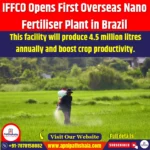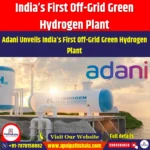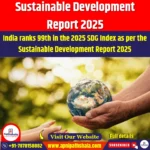IFFCO Opens First Overseas Nano Fertiliser Plant in Brazil
General Studies Paper III: Scientific Innovations & Discoveries, Agricultural Resources |
Why in News?
Recently, IFFCO announced the launch of its first overseas nano fertiliser plant in Brazil. The plant aims to serve global demand for sustainable farming solutions. This move marks a major step in India’s agricultural technology outreach.
IFFCO Opens First Overseas Nano Fertiliser Plant in Brazil
- Location:
- The plant is located in Curitiba, the capital of Paraná state.
- It features access to ports like Paranaguá, essential for both domestic and export logistics.
- Developed by:
- The plant is developed through a 70:30 joint venture between IFFCO Nanoventions (India) and Nanofert (Brazil).
- The project also stems from a June 2025 MoU with OCB, Brazil’s cooperative umbrella body.
- Features:
- The factory’s production is designed to be low-waste and eco-friendly.
- It will begin with 4.5 million litres annually and aims to double capacity in the coming years.
- Nano urea and nano DAP remain central to fertiliser manufacturing efforts.
- The site includes R&D partnerships with state bodies like Tecpar and local universities to support local innovation and adaptation.
- Plans also include local production of advanced nano inputs like nano zinc and nano copper in future phases.
Strategic Choice Behind the Location?
- Strong Agricultural Base: Brazil ranks among the top agricultural producers in the world. Brazil leads globally in producing soybeans, corn, sugarcane, coffee, and beef. As of 2024, agriculture contributed nearly 25% to Brazil’s GDP, including related agribusiness activities. Its vast land area, favorable climate, and mechanized farming methods make it a powerhouse in food production.
- Demand for Sustainable Farming: The expansion of agriculture into fragile ecosystems, particularly in the Amazon and Cerrado regions, has raised global concerns. Soil health has declined in some areas due to overuse of chemical fertilisers. As of 2023, Brazil imported nearly 80% of its fertiliser needs, making it vulnerable to price shocks.
- India–Brazil Bilateral Cooperation: Both nations are part of BRICS and G20 and collaborate on trade, environment, and technology. In 2023, trade between the two countries crossed $13 billion, with agri-tech and chemical sectors leading in volume.
- Fertiliser Technology Adoption: Brazil’s farmers are open to adopting modern techniques that reduce input costs and improve yields. Trials conducted by IFFCO in 2024 showed promising results. Use of nano urea and nano DAP led to yield increases of 10% in soybeans and 7% in sugarcane, while reducing chemical residue in soil.
Understanding Nano Fertilisers and Its Benefits
- Introduction:
- Nano fertilisers use particles sized between 1–100 nanometres to carry essential nutrients.
- Their nanoscale enables greater surface area and easier absorption into plant cells.
- They can be applied as liquids or foliar sprays. These forms allow nutrients to reach plant tissues more efficiently.
- Common materials used in these fertilizers include nano urea, nano DAP (Di-Ammonium Phosphate), nano zinc, and nano silica.
- Some also use natural polymers or nano clay to control nutrient release.
- There are three main categories:
- Nanoscale Input Fertilisers – nutrients are processed directly at the nanoscale (e.g., nano urea).
- Nanoscale Additive Fertilisers – nano materials are added to conventional fertilisers to enhance their function.
- Nano Coated Fertilisers – traditional fertilisers are coated with nano compounds that regulate nutrient release and improve uptake.
- Benefits:
- Traditional urea must be applied in large quantities, typically 45 kg per crop, with only 30–50% being used by plants.
- In contrast, nano urea uses 500 ml per crop, yet provides the same nutritional effect. Nanoparticles release nutrients slowly and precisely, reducing waste.
- Nano fertilisers enhance nutrient absorption by releasing nutrients slowly and steadily. They reduce runoff and leaching, which protects soil and water.
- They support sustainable farming and save subsidy costs.
- In India, pilot villages saw nano urea reduce regular fertilizer use by 28.3% while increasing yields by about 5.7%.
- Nano fertilisers reduce nutrient loss by limiting leaching and runoff. A 2023 analysis found nitrogen use dropped by 25%, reducing CO₂‑equivalents by 164 to 416 kg/ha.
What is IFFCO?
- Introduction:
- IFFCO, or the Indian Farmers Fertiliser Cooperative Limited, stands as one of India’s most influential cooperative organizations.
- IFFCO has significantly contributed to modernising India’s farm practices.
- IFFCO has expanded from being a fertiliser manufacturer to a global innovator in agri-technology.
- Foundation:
- IFFCO began its journey in November 1967, during a time when India faced severe fertilizer shortages and a growing need to improve agricultural productivity.
- It was established as a multi-unit cooperative society, aimed at ensuring affordable fertilisers reached Indian farmers.
- The goal was clear: provide high-quality fertilisers to farmers across India through a strong cooperative structure.
- Cooperative Model:
- IFFCO operates as a cooperative institution.
- It is owned by its members — the farmers themselves.
- As of 2025, it has more than 36,000 cooperative societies as members, representing millions of farmers.
- Each member contributes to IFFCO’s vision and growth.
- Profits are reinvested or distributed among members, ensuring farmers benefit directly.
- Significance:
- It introduced various grades of NPK (Nitrogen, Phosphorus, Potassium) fertilisers, along with specialty nutrients for soil and crop-specific needs.
- It has invested in fertiliser plants and joint ventures in countries like Oman, Jordan, and more recently Brazil.
- IFFCO continues to strengthen its research through institutions like the IFFCO Nano Biotechnology Research Centre (NBRC) in Gujarat.
- IFFCO launched digital tools such as IFFCO Kisan App, IFFCO eBazar, and Farmer Connect programs.
- It has helped India maintain food security, especially during the Green Revolution and later reforms.
- IFFCO now ranks as the world’s largest cooperative in GDP contribution terms, supporting over 5 crore farmers.
Nano Fertilisers in India
- Nano fertilisers are changing how India approaches agricultural productivity.
- IFFCO launched liquid nano urea in June 2021 and nano DAP in April 2023 in India.
- By FY 2024-25, IFFCO sold 36.5 million bottles—26.8 million nano urea and 9.7 million nano DAP—marking a 47 % rise over the previous year.
- These volumes equate to replacements for approx 1.2 million tonnes of urea and 0.48 million tonnes of DAP.
- Between 2024 and 2025, IFFCO conducted 1,470 two‑plot demonstrations across 15 agro‑climatic zones under government support.
- Trials showed average yield gains of 5.27 % for nano DAP and 5.28 % for nano urea compared to traditional fertilisers.
- On 1 July 2024, the Model Nano Village initiative was launched. This initiative set up 203 village clusters, each covering 2,000 acres.
- Over 90,000 farmers registered, treating 500,000 acres with nano fertilisers using drones and sprayers.
- Some farmers have reported rapid efficacy—seeing results in 2 days versus 5–7 days for granular fertilisers.
- Nano fertilisers have achieved modest market penetration. In FY 2024-25, nano urea accounted for 3.36 % of total urea consumption, and nano DAP for 5.04 % of total DAP consumption.
- On 2 July 2024, IFFCO and the Department of Fertilisers launched the Nano Fertilizer Usage Promotion Mahaabhiyan.
- Model deployment of 200 nano‑fertiliser village clusters across 800 villages.
- Provision of a 25% subsidy on Nano Urea Plus, Nano DAP, and Sagarika products.
- The programme also offers a ₹100/acre grant to drone entrepreneurs for application services.
- The 2024 Union Budget raised funding for organic and nano inputs by sixteen times. It endorsed expanding Nano‑DAP to all agro‑climatic zones, with ₹100 crore support for research and market development assistance (MDA).
- A dedicated nano DAP plant in Kalol began production in March 2023, with plans to hit 500 million bottles per year by 2025-26.









